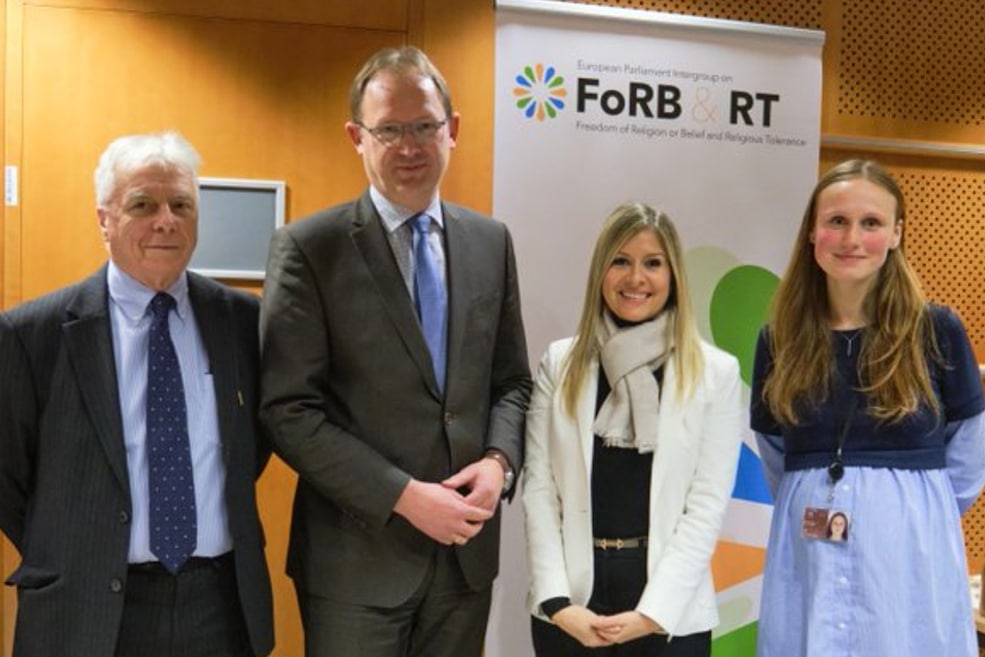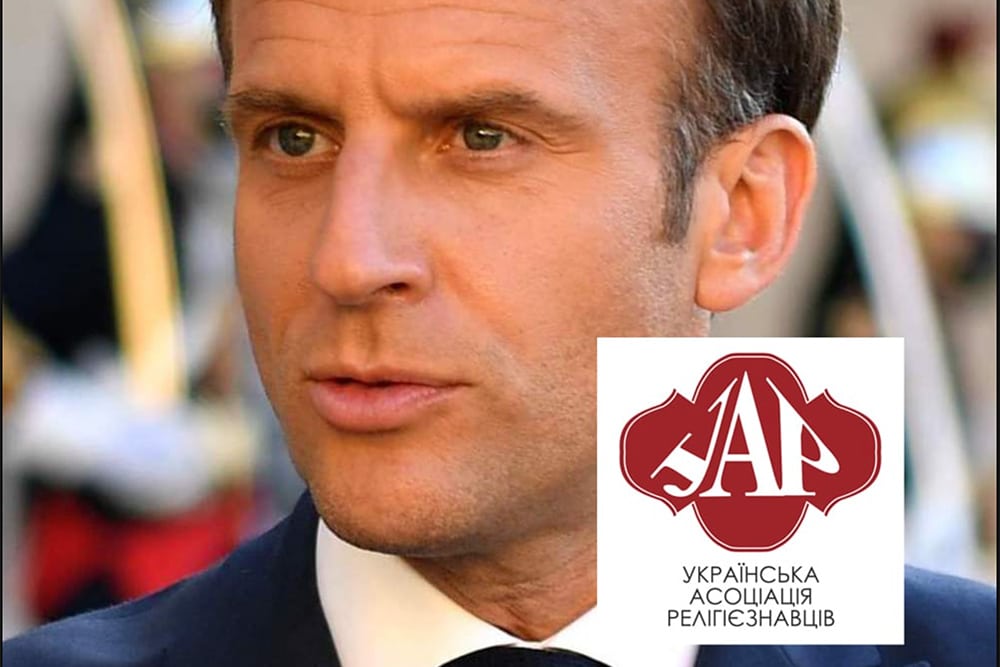In the shadow of the Football World Cup in Qatar, voices of non-Muslims have been heard and listened to at the European Parliament at a conference organized on 6 December by Dutch MEP Bert-Jan Ruissen under the title “Qatar: Addressing the limitations of religious freedom for Bahá’ís and Christians.”
This initiative of MEP Bert-Jan Ruissen, a member of the EP Intergroup on Freedom of Religion or Belief, was a followup of the resolution of the European Parliament on the “Situation of human rights in the context of the FIFA football world cup in Qatar” adopted on 24 November last plenary session. On that occasion, the Parliament called “on the Qatari authorities to ensure respect for the human rights of all persons attending the 2022 World Cup, including international guests and those living in the country, including for their freedom of religion and belief.”
During the conference, the situation of the Baha’is was addressed by Rachel Bayani from the office of the Baha’i International Community in Brussels. Here is a large excerpt of her intervention:
“Baha’is have lived in Qatar for almost 80 years. They are a very diverse community with members of Qatari citizenship or from other nationalities. They all consider Qatar their home.
Nevertheless, the community has suffered instances of discrimination and human rights violations over many decades. The cumulative effect of these acts has now become untenable because they threaten the very viability of the community. Over the decades, and more intensely in recent years, Baháʼís in Qatar have approached the Qatari authorities directly and with an open hand to seek remedy in areas where the State falls short of its obligations. Although various assurances and promises have periodically been given, they have not materialised.
Baha’is forced to leave the country
More and more Baháʼís have been forced to leave the country. The human rights violations they suffer are of various types, ranging from surveillance, the harassment of school children and students, the bulldozing of a Baha’i cemetery, violations in the employment sector and the sudden termination of work contracts, the non-recognition of personal status or marriage laws, the impossibility of family reunification, the refusal of a residency permit or the blacklisting for ‘security’ reasons because of their religious affiliation.
In some cases, Baháʼís resident in the country for generations are simply instructed to leave with no explanation whatsoever, are deported or have been refused permission to re-enter the country. Baha’i leadership positions are targeted with for instance the Chair of the National Assembly of the Baha’i of Qatar who is a Qatari national having recently been presented with a court ruling sentencing him in absentia to a period of imprisonment and a fine, and this clearly because of his religion.
In the employment sector, Baháʼís are systematically denied ‘certificates of good conduct’ needed for employment. This is a clearance to be obtained from state security. Baha’is are being refused these certificates though they have not committed any crime or misdemeanour. There is no transparency to the clearance process nor any right or means of appeal. Because employment is the key to residency, many families have lost their residency, and ultimately had to leave the country.
These problems, characterised as incidental by the authorities, and even presumed to be so by the Baháʼís themselves, gradually took the form of a pattern that was impossible to ignore or explain away.
The Baha’i community being invisibly and noiselessly suffocated
The Baha’i community knows all too well what it looks like when a country wants to extinguish an entire community. We have the example of Iran and how it systematically carries out its effort to slowly suffocate a community economically, socially and intellectually. One of the characteristics of that strategy is to proceed in a very calculated manner with the purpose to evade international attention.
The Baha’i community in Qatar counts in the low hundreds today. If it were not for the discrimination and the fact that many were forced to leave the country, the Baha’i community would today be much larger. So it is the survival of the community that is at stake.
His Highness Sheikh Tamim Bin Hamad Al Thani, the Emir of Qatar, said during his address to the United Nations General Assembly some weeks ago that the State of Qatar wanted to celebrate our common humanity, no matter how diverse our religions and nationalities may be. The Baha’i International Community welcomes these noble sentiments. And we thank His Highness for sharing them with the world. We look forward to a time when these words become reality with respect to the Baha’i community living in Qatar.”
And MEP Bert-Jan Ruissen concluded by saying “I call on Qatar to uphold the rights of the Baha’i community and to ensure that Baha’is are no longer expelled from the country or forced to leave.”
QATAR “I was expelled for life from Qatar because I was a Baha’i”
A Baha’i deported in 2015 denied entry in the country to attend the Football World Cup in November 2022
During the conference organized on 6 December by Dutch MEP Bert-Jan Ruissen under the title “Qatar: Addressing the limitations of religious freedom for Bahá’ís and Christians,“ a Baha’i (*) testified about his deportation from the country in 2015:
“My wife and I moved to Qatar from Kuwait in 1979. My wife, who was brought up in Qatar, wanted to be back where her family lived and had been serving the community since moving there in the early 50s.
I started teaching English language in a national oil and gas company. Later on, I moved to other jobs, all involved with training and development of Qatari nationals. I lived there very happily for 35 years until I was expelled in May 2015.
Our three children all went to government schools and are fluent in Arabic. Although they studied in British universities, they all chose to return to Qatar where they had been raised and where their friends were.
We were all well integrated but despite this, I was ordered to leave in May 2015. No official reason was ever presented to me for such a decision but I believe it was due to my activities as a Baha’i.
Freedom of expression and proselytism
Indeed, we, as Baha’is, do not hide or deny our religion and share with anyone interested, the principles and teachings of our faith. Our activities are mainly educational, aimed at a process of spiritual and moral education that builds capacity to serve the community and thus work for the betterment of the world. Our activities are very transparent and open to anyone, regardless of race, religion and nationality, who wants to benefit from them.
My understanding is that such activities have been misinterpreted by the authorities as proselytism, which is forbidden by law in Qatar.
In the Baha’i faith, imposing one’s belief on others, using any form of intimidation or offering material inducements to conversion is forbidden. However, everybody is welcome to join in Baha’i activities and the community if they wish.
When a Baha’i shares his or her belief with another person, the act is not an attempt to convince or otherwise prove a particular point. It is the expression of the sincere desire to engage in meaningful conversation about fundamental issues of existence, to seek the truth, to remove misconceptions and to foster unity. Baha’u’llah tells us that “The well-being of mankind, its peace and security are attainable unless and until its unity is firmly established.”
How my deportation was planned behind the scenes
In September 2013, my employers applied for the renewal of my resident permit which was due to expire in November. I was told that they had been unable to complete the renewal due to “problems with the system.” My employers continued regular followup but each time was told to “wait.”
In March 2014, my employers had to terminate my work contract as the administrative issue had been left without any solution. I contacted the British Embassy but they told they were unable to assist. I approached a lawyer who told me that law firms had been instructed not to take on cases related to security.
In April 2014, the Ministry of Interior told me that my departure was being treated as deportation under instruction from the State Security with no reason given. I appealed the decision and approached the National Human Rights Committee. I reported to the Immigration Department every week for several months as I was told.
In March 2015, The Immigration Department informed me that there would be no written response to my appeal and the security authorities had considered my presence was “not in the interest of the state.”
I was expelled on 24 May 2015. My wife remained in Qatar with our children to take care of her own elderly parents.
Banned from Qatar for life
It is important to mention that when I lived in Qatar, other Baha’is were expelled from the country and many of our youth were denied employment opportunities. These young people, many of whom were born and raised in Qatar and knew no other home, had no other choice but to leave. Some, who subsequently attempted to return, were denied entry and were blacklisted.
In December 2015 and August 2016, I applied for a visitor visa through Qatar Airways but both applications were rejected because they had not been approved by the security authorities.
On 17 November 2016, I was denied entry in the country when transiting at Hamad International Airport.
In September 2022, my daughter approached the British Embassy asking them to request, on compassionate grounds, a visit for me as my wife had been diagnosed with cancer. The application was denied.
In October 2022, as Qatar had openly declared that all were welcome to attend the World Cup, I applied for a Hayya card which required to enter the country and attend the football matches. My application was twice rejected.
(*) HRWF withholds his name for security reasons for his family.














